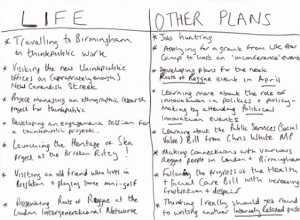
So apparently today has been declared International Day For Failure (hashtag #DayForFailure), where we’re encouraged to share our tales of failure in order to challenge our collective reluctance as human beings to acknowledge and learn from our mistakes. To borrow a phrase from the tech start up world, we should all be aiming to ‘fail fast’, figure out what’s working and what’s not and then take steps to improve.
As a former local government officer, it’s taken me a while to come round to the idea of being comfortable acknowledging one’s failures. I certainly don’t remember this being covered as part of the National Graduate Development Programme. Still, if I’ve learned anything in the five and a bit years since I left the sector (and some days I do question whether I have), it’s the importance of being honest with yourself at least about how projects went, what my contribution was to the deferred success and what I would do differently (given the chance).
To celebrate Day of Fail, I would like to share with you with you the fail I think about the most. I’m not sure if it’s my biggest fail (after all, it’s never wise to rule out unconscious incompetence) but it’s the one I have learned from the most.
Can you relate to my fail? If so, I’d love to know what happened and what you’ve learned from the experience.
Do you think failure can ever be honestly acknowledged or is the tendency to airbrush our pasts too great?
You can share your own fails (and what you learned from them) on Twitter using the hashtag #DayForFailure.
Failure to launch: Implementing a Disability Equality Scheme at Islington Council
Between 2007 and 2009 I worked as lead officer for disability equality at Islington Council. My overarching responsibility was to ensure the council took a pro-active approach to advancing equality for disabled people when delivering its functions.
Essentially, I was attempting to move the council’s approach to disability from one where staff would try to help individual disabled people who had difficulty accessing a library or leisure centre to one where the council worked with disabled people to design accessible services and identify barriers BEFORE an individual had to complain or ask for help.
So far, so simple. Unfortunately, for much of my time at Islington I found myself bogged down in the process of developing ambitious departmental action plans and getting these signed off. This took up energy and attention on both side – the time spent negotiating and renegotiating what actions would go into the action plans would have been much better spent actually getting out there and working with disabled people to make real world improvements to services.
Looking back on the episode with the benefit of hindsight, I can see both what I did wrong and the scale of the challenge I faced in trying to advance disability.
The way I approached the task contributed to the Disability Equality Scheme becoming bogged down. As a young(ish) and idealistic council officer, I sincerely believed in disability equality and was optimistic about the role the council could make to enabling disabled people to play a full and equal role in society. I naively assumed other officers would be on my wavelength or, at the very least, quickly come round to my way of thinking and make disability equality a priority.
I eventually realised that this was an unreasonably optimistic worldview. In the majority of cases, disability equality was but one of many priorities which departments were responding to. The more experienced senior managers I often found myself negotiating with got this and understood that whatever the letter of the law stated Islington Council should be doing on disability equality, local political priorities came first.
It also goes without saying that in any change process you should never under-estimate resistance that comes from fear of the new and possibly apathetic tendencies.
My passion for disability equality, together with my natural tendency to be a stickler for the letter of the law, led me to push for commitments from departments that were never going to fly. Were I to have my time again, I would like to think I would be more realistic about how much I could change the council and what tactics I would use to secure changes.
My top 3 lessons from my failure are:
- Be realistic about how much you can change and how much authority you have.
Just because the law says an organisation should be doing 10 things, don’t hold out for complete implementation. Form a realistic assessment of how much change is possible right now. Have frank conversations with senior leaders (both political and managerial) and agree with them how far they are prepared to go, explaining to them the risks they will have to assume if they should be deemed to not meeting their legal requirements
2. Get some early quick wins in early
This point is pretty obvious but when faced with a complex task, it’s easy to get bogged down in the more contentious aspects. I did partly achieve this at Islington, securing important improvements to the accessibility of public buildings and council information. I wish I had spent less time negotiating action plans and more time making sure staff were supported to spot and address the little barriers which collectively make a big difference.
3. Recognise and work with the grain of different personalities
I mentioned earlier how I assumed most people would be committed to disability equality. I was wrong about this. It’s not that people were hostile to equality, it was that it was not top of their list of priorities.
At Islington I got over my initial naivety and used a variety of carrots and sticks to secure change. With any change project it is necessary to use different tactics to bring on board supporters or neutralise blockers but looking back now I wish I had spent more time working with those people who were amenable to disability equality, rather than spending time and energy trying to persuade more reluctant departments and individuals.
Can you relate to my fail? If so, I’d love to know what happened and what you’ve learned from the experience.
Do you think failure can ever be honestly acknowledged or is the tendency to airbrush our pasts too great?
You can share your own fails (and what you learned from them) on Twitter using the hashtag #DayForFailure.










